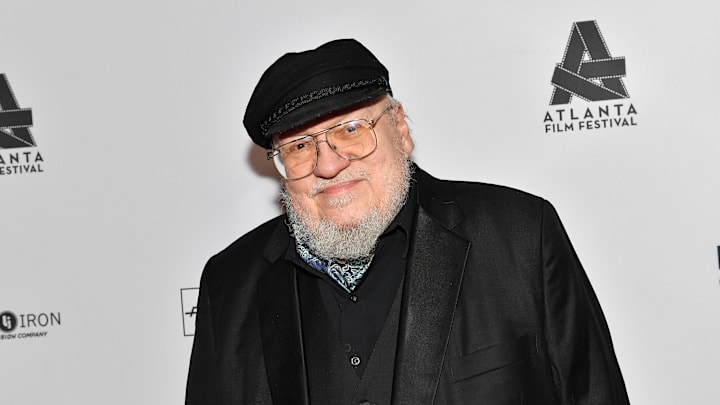Generative AI was one of the hottest button issues of 2023, and will be affecting the creative industries for years to come. Is there a market for illustrators when programs like Midjourney can produce high-quality images in seconds based on a quick prompt? Is there a need for professional writers when ChatGPT can spit out reams of text with very little input?
Authors like George R.R. Martin -- the man behind A Song of Ice and Fire, which HBO adapted as the phenomonally successful TV show Game of Thrones -- are upset about this. Appearing alongside author Bernard Cornwell -- whose Saxon Stories novels were adapted by Netflix as The Last Kingdom, a medieval drama series about warlord Uhtred of Bebbanburg -- on Bangcast, he explained what he's doing about it. "I've just joined a class action suit that the Authors Guild is sponsoring and we're suing [OpenAI, the creators of ChatGPT], because the fuel for these AI books is our books; all of my books have been fed into ChatGPT and it's digested them, and I'm sure all of Bernard's books," Martin said.
"You could go to ChatGPT and say: 'Write me an Uhtred book.' In fact, you could take that idea that I just threw out as a joke: 'Write me a book where Sharpe meets Flashman. And it has read all of George MacDonald Fraser's [Flashman] books. It's read all of Bernard's books. And it will digest them and it will write them and it will produce a book. Will it be a good book? Probably not. These are very derivative works...It can't create anything really original. It can just rehash and find common elements and do something. But still, what it can do is pretty impressive compared to what it could do five years ago. So will it ever be able to do an actual good book? Will it ever be able to create anything truly original, or will it just rehash what it can from from existing raw materials that are fed into it?"
For the record, the Sharpe books are another one of Cornwell's series, about a solider in the Napoleaon wars played in a popular miniseries by Sean Bean. And the Flashman books by George MacDonald Fraser are about a cowardly British soldier who lives through major historical events in the 19th century.
As for the questions Martin poses, he says he's not afraid of AI writing a good original book in "the near future." But that implies that he thinks it could be possible down the line. But if that happens, it will only be because AI companies like OpenAI have been allowed to absorb the works of people like Martin without permission or remuneration. Martin's lawsuit, which he's mounting alongside other authors like John Grisham and Jonathan Franzen, is designed to stop that practice by alleging “mass-scale copyright infringement" on the part of OpenAI.
"[T]here is a lot of effort to control this," Martin said. "The Authors Guild suit that I'm part of is only one of half a dozen lawsuits have been fired...A lot of publishers or magazines have said we won't use AI-generated work. There are a few science fiction magazines here in the United States that are being deluged by AI submissions. Manuscripts come in over the over the internet...How can you tell whether it's AI-generated or not? Not easily. We have some interesting times ahead and a lot of it is gonna depend on how some of these lawsuits resolve."
"There is also the impact that AI is gonna have on films and motion pictures because of the ability to recreate actors. Maybe the next time they revive Uhtred, Humphrey Bogart will play him. AI can take the script and create Humphrey Bogart or Errol Flynn or Marlon Brando. Whoever you want can play any part. We can have Marilyn Monroe and the young Liz Taylor back, Gina Lollobrigida or whoever you want; put them in your thing and there you have it. So what does that do to current actors if you're having to compete for roles with the ghosts of Humphrey Bogart and Charlie Chaplin and whoever?"
The Last Kingdom creator Bernard Cornwell thinks AI will be able to write a novel, but isn't worried
So that's Martin had to say on the subject? Is Bernard Cornwell worried also ChatGPT writing a novel/ "I'm too old to be worried," said the 79-year-old author. "I'll be dead by the time it can write a book."
"I don't think that ChatGPT can write a book. It might get the characters right. It might even get the action right. But it won't get the emotion behind the action right."
Cornwell sounds like he's giving mixed signals here, but also, he's made it clear that he doesn't particularly care about the issue, so maybe he hasn't taken the time to get his thoughts completely straight. "I think eventually eventually there will be an AI-originated novel that is decent, but I'm equally certain I'll be dead," he said. "So I'm not going to worry about it."
Authors everywhere are grappling with these kinds of questions. For another perspective from a younger author, you could look at Brandon Sanderson, the guy behind the Mistborn and Stormlight Archive books. He thinks AI will eventually be able to write a decent book, but doesn't think it will affect human authors overmuch:
To stay up to date on everything fantasy, science fiction, and WiC, follow our all-encompassing Facebook page and sign up for our exclusive newsletter.
Get HBO, Starz, Showtime and MORE for FREE with a no-risk, 7-day free trial of Amazon Channels
